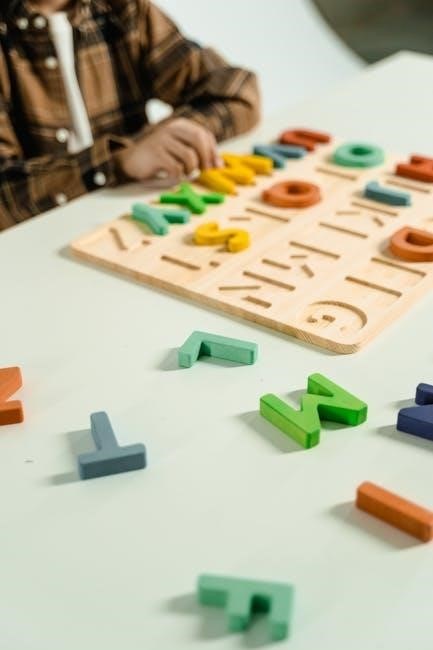Preschool assessment forms in PDF format are tools for evaluating children’s developmental progress․ They help educators and parents track milestones and identify support needs effectively․

Purpose and Importance of Preschool Assessment Forms
Preschool assessment forms are essential for tracking children’s progress, identifying strengths, and areas needing support․ They guide curriculum planning and ensure consistent evaluation of developmental growth․
Evaluating Developmental Milestones
Preschool assessment forms PDF are designed to evaluate developmental milestones, ensuring children meet expected skills in cognitive, social, emotional, and physical domains․ These tools help track progress in areas like color recognition, shape identification, and number sense․ By assessing motor skills and language development, educators can identify early signs of delays or advanced abilities․ This evaluation supports personalized learning plans, fostering a child’s overall growth․ Regular assessments also provide insights into play-based learning effectiveness and readiness for kindergarten․ Through structured observations and activities, these forms enable a comprehensive understanding of each child’s developmental journey, ensuring timely interventions and enriched learning experiences tailored to their needs․
Identifying Areas for Support and Enrichment
Preschool assessment forms PDF play a crucial role in pinpointing areas where children may require additional support or enrichment․ By evaluating developmental milestones, these tools help educators and parents identify specific needs in literacy, numeracy, or social skills․ This targeted approach allows for the creation of personalized learning plans that address gaps and enhance strengths․ Collaboration between educators and parents is facilitated, ensuring consistent support․ Regular assessments provide insights into progress, enabling timely adjustments to teaching strategies․ This tailored support fosters an inclusive learning environment, promoting each child’s unique growth and readiness for future educational challenges, ensuring no child is left behind․
Types of Preschool Assessments
Preschool assessments include cognitive, social-emotional, and physical/motor skills evaluations․ These tools help identify developmental strengths and areas needing attention, supporting personalized learning plans and growth․
Cognitive Skills Assessment
Cognitive skills assessments evaluate a child’s thinking, learning, and problem-solving abilities․ These tools help identify developmental milestones in areas like memory, reasoning, and language skills․ Preschool assessment forms often include activities such as shape and color recognition, number identification, and basic math concepts․ They also assess a child’s ability to follow instructions and understand sequencing․ By using these forms, educators and parents can track progress and identify areas where additional support may be needed․ This information is crucial for creating tailored learning strategies to enhance a child’s cognitive development․ Regular cognitive assessments ensure a strong foundation for future academic success, making them an essential part of early childhood education․
Social-Emotional Development Evaluation
Social-emotional development evaluations focus on assessing a child’s ability to interact with others, manage emotions, and develop self-awareness․ These assessments often include observations of cooperation, empathy, and self-control․ Preschool assessment forms may incorporate activities that evaluate how children share, take turns, and express feelings․ Teachers and parents can use these tools to identify areas where a child may need additional support, such as conflict resolution or emotional regulation; By monitoring social-emotional growth, educators can provide targeted strategies to foster healthy relationships and resilience․ This evaluation is crucial for helping children develop essential life skills and ensuring a positive transition into further education and social environments․
Physical and Motor Skills Assessment
Physical and motor skills assessments evaluate a child’s ability to perform tasks requiring coordination, balance, and strength․ These assessments focus on both fine motor skills, such as using utensils or drawing, and gross motor skills, like running or climbing․ Preschool assessment forms often include activities or observations to measure dexterity, hand-eye coordination, and overall physical development․ By identifying areas where a child may need practice, educators and parents can provide targeted support․ Regular monitoring of motor skills helps ensure children meet developmental milestones, fostering independence and confidence․ These assessments play a key role in promoting physical growth and readiness for more complex activities in future educational settings․
Creating Effective Preschool Assessment Forms
Effective preschool assessment forms are clear, comprehensive, and user-friendly, ensuring accurate documentation of developmental progress; They include essential sections and are designed for easy use by educators and parents․
Essential Sections to Include
When creating effective preschool assessment forms, it is crucial to include sections that cover key developmental areas․ Start with a section for documenting developmental milestones, such as cognitive, social-emotional, and physical skills․ Include a skills assessment checklist to track progress in areas like literacy, numeracy, and motor skills․ Add a section for progress tracking over time, allowing educators to monitor growth․ Also, incorporate a summary area for observations and recommendations․ Ensure the forms are customizable to meet individual needs․ Clear and concise language, along with organized formatting, will make the forms user-friendly for both teachers and parents․ This structure ensures comprehensive and actionable data collection․
Designing User-Friendly Templates
Creating user-friendly preschool assessment templates is essential for effective data collection․ Use clear and simple language, ensuring sections are well-organized and easy to navigate․ Include visual cues like checkboxes, dropdowns, and rating scales to simplify input․ Ensure the layout is clean, with ample spacing to avoid clutter․ Make templates customizable to accommodate different assessment needs and preferences․ Incorporate instructions or examples where necessary to guide users․ Ensure compatibility with both digital and print formats for flexibility․ By prioritizing accessibility and intuitiveness, these templates will streamline the assessment process for educators and parents, making it easier to focus on supporting children’s development․
Benefits for Educators and Parents
Preschool assessment forms PDF benefit educators and parents by tracking progress, enhancing communication, and providing insights to support children’s development․ They offer a clear view of strengths and areas needing improvement․
Tracking Progress and Growth
Preschool assessment forms PDF enable educators and parents to systematically track a child’s developmental progress․ By documenting milestones and skills over time, these tools provide a clear record of growth․ Regular observations and evaluations help identify patterns, strengths, and areas needing attention․ This longitudinal approach allows for informed decision-making, ensuring tailored support for each child․ The organized data also facilitates communication between stakeholders, fostering a collaborative approach to early childhood education․ With these forms, progress monitoring becomes efficient and effective, helping children reach their full potential through targeted interventions and enriched learning experiences․ They serve as a valuable resource for celebrating achievements and addressing challenges promptly․
Enhancing Communication Between Stakeholders
Preschool assessment forms PDF serve as a bridge for effective communication among educators, parents, and administrators․ By providing a standardized format, these forms ensure that all stakeholders share a common understanding of a child’s developmental status․ Teachers can easily convey progress and concerns to parents through clear, structured documentation․ This fosters collaboration and alignment in supporting the child’s growth․ The use of consistent language and data in these forms minimizes misunderstandings, enabling parents to reinforce learning at home․ Additionally, the accessibility of PDF formats allows for easy sharing via email or during meetings, ensuring that everyone involved in the child’s education is informed and aligned․ This seamless communication is vital for creating a cohesive support system for young learners․

Commonly Used Tools and Resources
Popular tools include DECA-P2, printable templates, and digital assessment software, aiding educators in tracking progress and organizing developmental data effectively for preschoolers․
Recommended PDF Templates
Recommended PDF templates for preschool assessments offer structured formats to track developmental milestones․ These templates include sections for cognitive, social-emotional, and physical skills, providing a comprehensive overview․ Many free templates, such as the Preschool Assessment Binder Pack, include customizable sheets for progress tracking and organization․ They often feature specific assessments like math skills, color recognition, and counting abilities․ These tools are designed to be user-friendly, allowing educators and parents to document growth effectively․ Popular templates also include the Mother Goose Time curriculum assessments, which focus on hands-on learning and developmental progress․ By using these PDF templates, users can ensure consistency and clarity in evaluating preschoolers’ development․

Digital Tools for Assessment
Digital tools for preschool assessment offer innovative ways to evaluate and track children’s development․ Platforms like the Preschool Assessment Binder Pack and Mother Goose Time provide digital versions of their PDF templates, allowing educators to easily customize and share assessments․ These tools often include interactive features, such as progress tracking dashboards and automated scoring, making it simpler to monitor growth․ Apps and online platforms enable real-time data entry and analysis, reducing paperwork․ Additionally, digital tools facilitate seamless communication between teachers and parents, ensuring everyone is aligned on a child’s progress․ They also support accessibility, as assessments can be completed on tablets or computers, making the process more efficient and engaging for young learners․

Best Practices for Using Assessment Forms
Use assessment forms consistently, provide clear instructions, and interpret results constructively․ Ensure collaboration between educators and parents for accurate tracking and supportive interventions, fostering a child-centered approach․
Ensuring Consistency in Evaluation
Consistency in evaluation is vital for accurate tracking of a child’s progress․ Standardized assessment forms ensure uniformity in measuring developmental milestones across different educators and settings․ Clear instructions and training for staff help maintain reliability․ Regular calibration meetings among teachers can reduce variability in scoring․ Using the same tools and criteria for all children ensures fairness and comparability․ Establishing a routine for administration, such as specific intervals or activities, further enhances consistency․ Digital tools with predefined scales and criteria can minimize subjective interpretations․ By maintaining consistency, educators can reliably identify patterns, strengths, and areas needing support, ensuring equitable and effective evaluations for all preschoolers․
Interpreting Results Constructively
Interpreting preschool assessment results constructively involves using data to inform individualized plans and support a child’s growth․ Educators should focus on identifying strengths and areas for improvement, ensuring interpretations are fair and unbiased․ Results should guide teaching strategies and interventions, rather than labeling a child․ Clear communication with parents is essential, emphasizing progress and providing actionable steps․ Constructive interpretation involves celebrating milestones achieved while addressing gaps with tailored support․ By focusing on specific, observable behaviors, educators can set realistic goals and provide examples for improvement․ This approach fosters a positive and supportive environment, ensuring assessments serve as tools for growth rather than judgment․
